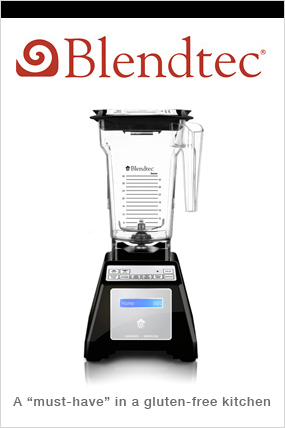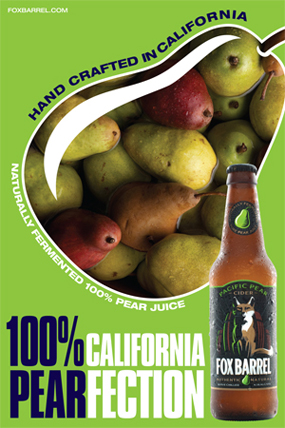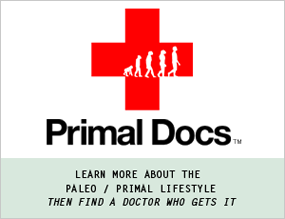A note from Chris: When I started this website back in 2004, I along with most folks in the gluten-free blogging community were devoted to bringing you the latest and greatest gluten-free products as well as restaurants with gluten-free menus. I as many celiacs would sing the praises of any company willing to bring a new product to market that catered to what at the time was a niche market. The problem lies in the fact that the bulk of those packaged items have been what people now define the gluten-free diet by — this is a problem — a big problem.
I’ve invited Jordan Reasoner from SCDLifestyle.com to elaborate on this a little more. This is his first guest post (the first of hopefully quite a few on Celiac Handbook). He along with his colleague, Steve Wright don’t hold anything back and will say things that a lot of folks don’t necessarily want to hear — but need to hear nonetheless. Before we get into this first post from Jordan, here’s a brief bio to give you a little more background on who he is and where you can find more of his work:
Jordan Reasoner is a health engineer and author. He was diagnosed with celiac disease in 2007 and almost gave up hope when a gluten-free diet didn’t work. Since then, he transformed his health using the SCD Diet and started SCDLifestyle.com with Steve Wright, a blog on digestive disease and stress reduction where you can learn simple, but effective techniques to naturally heal your stomach problems.

Conventional medicine usually works like this…
I have a problem, the doctor figures out what the problem is, and then gives me a conventional prescription generally supported by Doctors, researchers, and the FDA.
This prescription is supposed to be relatively safe and effective in accordance with the laws in the United States and most modern countries.
But what if the conventional prescription doesn’t work?
Like people with celiac disease that follow a strict gluten-free diet and don’t get better…
Does that mean the gluten-free diet is the wrong prescription for celiac disease?
Earlier in my Celiac series, I showed that gluten is a toxic invader that causes celiac disease. Logically, removing the intruder is the first step towards treatment. That’s why anyone diagnosed with this autoimmune condition gets the conventional celiac disease prescription: follow a strict gluten-free diet for life. But the latest celiac disease research is painting a very different picture.
The University of Chicago has one of the leading treatment and research centers for celiac disease in the U.S., so my jaw dropped when they posted this:
While healing may take up to 2 years for many older adults, new research shows that the small intestines of up to 60% of adults never completely heal, especially when adherence to the diet is less than optimal.”[1].
60% odds are worse than flipping a coin…
It would be easy to read that and think, So it’s the people that don’t follow a strict gluten-free diet that don’t heal… But to be honest, I don’t think they said it as strongly as they should have. Here’s a recent study that paints a much darker picture of the gluten-free diet’s success rate.
Only 8% of adult patients healed on a gluten-free diet…
A 2009 study in The Journal of Alimentary Pharmacology and Therapeutics looked at 465 celiac disease patients and found only 8% of adult patients reached “histological normalization” after following a gluten-free diet for 16-months, meaning their gut tissue completely recovered to that of a healthy person. The authors stated:
Complete normalization of duodenal lesions is exceptionally rare in adult coeliac patients despite adherence to GFD[2]
These people followed a strict gluten-free diet for 16-months and most didnít heal their gut. The success rates of these studies show the conventional celiac disease prescription isn’t working
Another 2010 study in the American Journal of Gastroenterology looked at 381 adults with biopsy-proven celiac disease. The authors found small intestine mucosal recovery occurred in only 34% of participants following a Gluten-Free diet for 2-years. They concluded:
Mucosal recovery was absent in a substantial portion of adults with CD after treatment with a GFD.[3]
The Conventional Merck Manual definition for diagnosing celiac disease provides that: The diagnosis is confirmed by an initial microscopic examination of a biopsy specimen revealing flattened villi of the small intestine and by a subsequent improvement in the lining after the person stops eating foods containing gluten.
These studies clearly show that when a Celiac stops eating foods containing gluten, the intestinal lining isn’t healing. But that’s only scratching the surface of what’s going on…
65% of gluten-free Celiacs still have a raging fire in their gut
The same 2009 study in The Journal of Alimentary Pharmacology and Therapeutics of 465 celiac disease patients 16-months gluten-free found that 65% still had “persistent intraepithelial lymphocytosis” AKA inflammation in the gut.[4]
Their intestines are on fire with inflammation even after 16-months gluten-free. Why is that important?
We know gut inflammation is associated with a laundry list of health issues, including cancer and early death. Thatís bad news for the conventional Celiac prescription and even worse news for the people not getting better on a gluten-free diet. Want more evidence gluten-free doesn’t put the fire out?
A 2008 study in the Journal of Inflammation looked at 18 symptom-free celiac disease (SFCD) patients and found they still had elevated markers of gut inflammation even after 2 years on a gluten-free diet. The authors reported:
Faeces of both active CD and SFCD (symptom-free 1-2 years on a GFD) patients, representing an imbalanced microbiota, significantly increased TNF-alpha production and CD86 expression in PBMCs, while decreased IL-10 cytokine production and CD4 expression compared with control samples.[5]
In another 2009 study from the American Journal of Gastroenterology, researchers looked at small intestine biopsies from 45 children with celiac disease and 18 clinical controls. The authors found an increased presence of T cells (inflammatory marker) in well-treated CD patients:
The long-lasting presence of high frequencies of T cells in the epithelial compartment in well-treated CD indicates that the epithelium is stressed possibly because of constant attack. [6]
Both these studies looked at patients that are supposed to be healed supposedly well-treated. Even though they appeared to be symptom-free, the medical tests paint a much different picture. These asymptomatic adults and kids still had inflammatory fires raging in their gut promoting further disease development (like Cancer).
So far this research has only reviewed patients following a gluten-free diet for 1-2 years but what about long term? Does the body just need more time to heal and get back to normal?
56% have poor vitamin status after 10 years gluten-free
A 2002 study in the of Alimentary Pharmacology and Therapeutics looked at the vitamin status of 30 adults with celiac disease showing biopsy-proven remission, after following a gluten-free diet for 8-12 years. They found that 56% had poor vitamin status, suggesting that proper nutrient uptake is not occurring. The authors concluded that:
It is generally assumed that coeliac patients adhering to a strict gluten-free diet for years will consume a diet that is nutritionally adequate. This is supported by the demonstration of a normal bone mineral density up to 10 years of dietary treatment. Our results may indicate otherwise. We found signs indicative of a poor vitamin status in 56% of treated adult coeliac patients.[7]
Even after following the conventional Celiac prescription for 10 years 56% still showed signs of poor nutrient uptake, meaning their digestive system still isn’t working like it’s designed to.
That means after 10 years of being gluten-free, HALF of all Celaics are likely starving for the critical nutrients required for health and longevity. It’s no wonder we have a 77X increased risk for lymphoma.[8]
The gluten-free diet doesn’t fix leaky gut
Earlier in my Celiac series, we discovered that gliadin initiates leaky gut by increasing the zonulin protein in people with celiac disease. And later in the series, we learned that fixing leaky gut is absolutely essential to reversing the damage from celiac disease.
But the gluten-free diet doesn’t fix leaky gut.
As it turns out, when celiac disease patients follow a strict gluten-free diet, their zonulin levels do fall (which is good). But research shows that they still have elevated levels of zonulin compared to non-Celiacs. And when the zonulin levels are still high the Tight Junctions can’t restore normal function and the leaky gut remains.
Chris Masterjohn found the same thing reviewing a study by researcher Allessio Fasano,[9]
Remarkably, they found that celiacs produce 30 times as much zonulin as non-celiacs, even though the non-celiacs were not eating gluten-free diets while the celiacs had been off gluten for over two years!
Here’s a graph of their data:

This is remarkable because even though the point of the study was to show that gluten increases zonulin production, the controls were eating gluten yet had infinitesimal levels of zonulin production, while the celiacs had not eaten gluten for at least two years yet still had very high levels of zonulin production. This suggests that something besides gluten may be causing zonulin production in celiacs.
Chris also pointed out the same study looked at Leaky Gut in celiac disease patients following a gluten-free diet for more than two-years:
[NOTE: in the graph below, the smaller the bar, the leakier the gut is]

Here they measured trans-epithelial electrical resistance (TEER) of intestinal tissue taken from gluten-free celiacs and gluten-eating controls. TEER is an estimation of the leakiness of the gut, where a lower value indicates a greater level of leakiness or permeability. They found that tissues taken from controls who had been eating gluten had three-fold less leakiness compared to celiacs who had been off gluten for over two years. This, again, suggests that something besides gluten may be contributing to leaky gut in people with celiac.
So in summary, Chris pointed out:
- Celiacs produce 30 times as much zonulin as non-celiacs, even though the celiacs had been off gluten for over two years!
- Intestinal tissues taken from controls who had been eating gluten had three-fold less leakiness compared to Celiacs who had been off gluten for over two years (so Celiacs had a much leakier gut, even while eating gluten-free)
But the evidence doesn’t stop there
A 2008 study in the Brazilian Journal of Medical and Biological Research tested for leaky gut in 22 celiac disease patients who were on a gluten-free diet for 1 year. They found these patients following a gluten-free diet still had a much leakier gut compared to healthy controls eating gluten (0.013 vs 0.003, P = 0.001). The authors concluded:
This means that, at some time, complete recovery of intestinal villous may not have occurred and an inflammatory process may have persisted.[10]
This is crazy! All this research shows the gluten-free diet doesn’t heal celiac disease. In fact, the evidence suggests that in many cases, leaky gut and inflammation remain high for years on a gluten-free diet. This spells bad news for anyone with celiac disease relying on a gluten-free diet as the only treatment protocol…
It breaks down like this high inflammation, poor vitamin status, and leaky gut persist on a gluten-free diet which leads to one thing: untreated celiac disease…
And untreated celiac disease will kill you fast
If you don’t completely heal from celiac disease, you’re going to die much sooner than healthy people. In fact, one of the largest cohort studies on celiac disease patients and mortality published in the Journal of The American Medical Association found that:
- Those with celiac disease (villous atrophy) had a 2.80-fold increased risk of death the first year after diagnosis and a 39% increased risk of death over the study period
But the authors didn’t stop there they also looked at people with intestinal inflammation. Remember the two studies on “well-treated” (asymptomatic) patients that still had inflammation? The authors found:
- Those with intestinal inflammation (and not villous atrophy) had a 4.66-fold increased risk of death the first year after diagnosis and a 72% increased risk of death over the study period[11]
A 72% increased risk of death!
In other words, if youíre a symptom-free Celiac and your labs show signs of gut inflammation you’re at risk to die much sooner than you think.
So should Celiacs eat a gluten-free diet?
Yes, gluten is still the kryptonite in celiac disease, don’t ever eat it. Following a gluten-free diet is a requirement for treating this autoimmune condition but you can’t stop there.
This evidence suggests that following a gluten-free diet doesn’t fix leaky gut, gut inflammation, or a damaged gut lining. That means the gluten-free diet isn’t enough to treat celiac disease patients and anyone using it as the only protocol is at risk for dying much sooner than they should…
The conventional Celiac prescription isn’t enough. There needs to be more.
In the next part of this series, I’ll explore the leaky gut-Celiac connection and what to do about it.
- Jordan
Citations:
1. http://www.cureceliacdisease.org/medical-professionals/guide/treatment
2. Complete recovery of intestinal mucosa occurs very rarely in adult coeliac patients despite adherence to gluten-free diet. Lanzini A, Lanzarotto F, Villanacci V, Mora A, Bertolazzi S, Turini D, Carella G, Malagoli A, Ferrante G, Cesana BM, Ricci C. Aliment Pharmacol Ther. 2009 Jun 15;29(12):1299-308. Epub 2009 Mar 3.
3. Mucosal recovery and mortality in adults with celiac disease after treatment with a gluten-free diet. Rubio-Tapia A, Rahim MW, See JA, Lahr BD, Wu TT, Murray JA. Am J Gastroenterol. 2010 Jun;105(6):1412-20. Epub 2010 Feb 9.
4. Complete recovery of intestinal mucosa occurs very rarely in adult coeliac patients despite adherence to gluten-free diet. Lanzini A, Lanzarotto F, Villanacci V, Mora A, Bertolazzi S, Turini D, Carella G, Malagoli A, Ferrante G, Cesana BM, Ricci C. Aliment Pharmacol Ther. 2009 Jun 15;29(12):1299-308. Epub 2009 Mar 3.
5. Bifidobacterium strains suppress in vitro the pro-inflammatory milieu triggered by the large intestinal microbiota of coeliac patients. Medina M, De Palma G, Ribes-Koninckx C, Calabuig M, Sanz Y. J Inflamm (Lond). 2008 Nov 3;5:19.
6. Proximal small intestinal microbiota and identification of rod-shaped bacteria associated with childhood celiac disease. Ou G, Hedberg M, Hörstedt P, Baranov V, Forsberg G, Drobni M, Sandström O, Wai SN, Johansson I, Hammarström ML, Hernell O, Hammarström S. Am J Gastroenterol. 2009 Dec;104(12):3058-67. Epub 2009 Sep 15.
7. Evidence of poor vitamin status in coeliac patients on a gluten-free diet for 10 years. Hallert C, Grant C, Grehn S, Grännö C, Hultén S, Midhagen G, Ström M, Svensson H, Valdimarsson T. Aliment Pharmacol Ther. 2002 Jul;16(7):1333-9.
8. Malignancy in coeliac disease–effect of a gluten free diet. Holmes GK, Prior P, Lane MR, Pope D, Allan RN. Gut. 1989 Mar;30(3):333-8.
9. Gliadin, zonulin and gut permeability: Effects on celiac and non-celiac intestinal mucosa and intestinal cell lines.Drago S, El Asmar R, Di Pierro M, Grazia Clemente M, Tripathi A, Sapone A, Thakar M, Iacono G, Carroccio A, D’Agate C, Not T, Zampini L, Catassi C, Fasano A. Scand J Gastroenterol. 2006 Apr;41(4):408-19.
10. Gut permeability to lactulose and mannitol differs in treated Crohn’s disease and celiac disease patients and healthy subjects.Vilela EG, Torres HO, Ferrari ML, Lima AS, Cunha AS. Braz J Med Biol Res. 2008 Dec;41(12):1105-9.
11. Small-Intestinal Histopathology and Mortality Risk in Celiac Disease Jonas F. Ludvigsson, Scott M. Montgomery, Anders Ekbom, Lena Brandt, Fredrik Granath JAMA. 2009;302(11):1171-1178.





